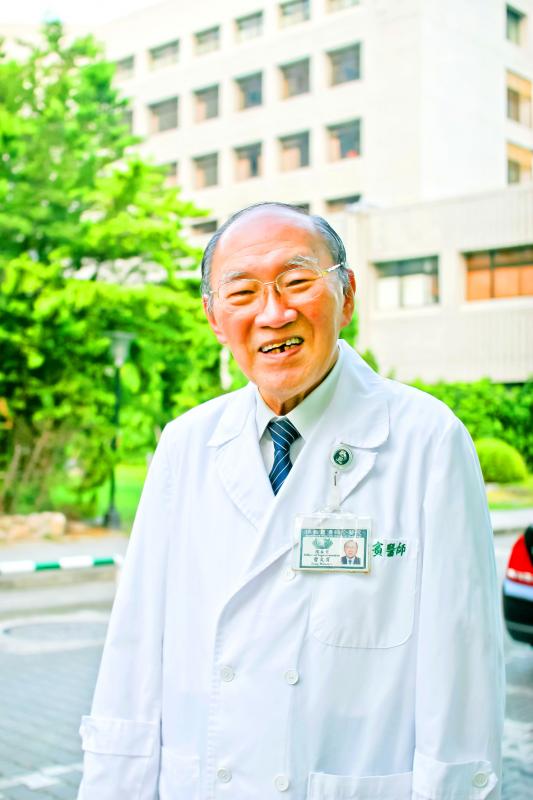Tseng Wen-pin (曾文賓), who is known as one of Taiwan’s “fathers of blackfoot disease,” passed away in his sleep on Sunday evening in Hualien County. He was aged 98.
A memorial service for Tseng is to be held at Hualien Tzu Chi Hospital on Dec. 20, the hospital said yesterday, adding that an academic seminar would be held in his honor the same day.
Tseng, who was an honorary superintendent of the hospital, practiced medicine for more than 50 years. He earned the title of Taiwan’s “father of blackfoot disease” for his dedication to researching the peripheral vascular disease.

Photo courtesy of Hualien Tzu Chi Hospital
In 1958, while he was a part-time attending physician at National Taiwan University (NTU) Hospital’s Department of Internal Medicine, Tseng joined the blackfoot disease research team at NTU’s College of Medicine.
As part of his research, he traveled to the central and southern parts of the nation several times to collect information on thousands of cases, and discovered that the disease was caused by elevated levels of arsenic in well water.
In 1968, his research on the relationship between the prevalence of the disease and arsenic content in drinking water was published in an international journal on environmental health.
The article has been cited more than 1,000 times, earning Tseng respect from the international community and status as a pioneer in epidemiology in Taiwan.
Tseng also helped to facilitate a NT$800 million (US$27.77 million) government investment to increase the penetration rate of tap water and prevent blackfoot disease.
About 150,000 people from four townships benefited from the project at the time.
In the 1970s, Tseng also proposed important research on the prevention and treatment of high blood pressure and coronary heart disease in middle-aged and older Taiwanese, as well as epidemiological research on cardiovascular disease among Aborigines.
Following the opening of Hualien Tzu Chi Hospital, Tseng resigned as deputy superintendent of NTU Hospital and moved to Hualien with his wife to serve the community there.
In 1989, he took over as superintendent of the Hualien hospital, and oversaw the completion of what is now known as the Tzu Chi University of Science and Technology in Hualien.
Tseng was named the recipient of the special contribution award at the 15th Medical Dedication Awards in 2005 for a lifetime of outstanding contributions to the field of epidemiology.

A magnitude 4.9 earthquake struck off Tainan at 11:47am today, the Central Weather Administration (CWA) said. The hypocenter was 32.3km northeast of Tainan City Hall at a depth of 7.3km, CWA data showed. The intensity of the quake, which gauges the actual effect of a seismic event, measured 4 in Tainan and Chiayi County on Taiwan's seven-tier intensity scale, the data showed. The quake had an intensity of 3 in Chiayi City and County, and Yunlin County, while it was measured as 2 in Kaohsiung, Nantou County, Changhua County, Taitung County and offshore Penghu County, the data showed. There were no immediate reports of

‘DENIAL DEFENSE’: The US would increase its military presence with uncrewed ships, and submarines, while boosting defense in the Indo-Pacific, a Pete Hegseth memo said The US is reorienting its military strategy to focus primarily on deterring a potential Chinese invasion of Taiwan, a memo signed by US Secretary of Defense Pete Hegseth showed. The memo also called on Taiwan to increase its defense spending. The document, known as the “Interim National Defense Strategic Guidance,” was distributed this month and detailed the national defense plans of US President Donald Trump’s administration, an article in the Washington Post said on Saturday. It outlines how the US can prepare for a potential war with China and defend itself from threats in the “near abroad,” including Greenland and the Panama

The Chinese Nationalist Party (KMT) is maintaining close ties with Beijing, the Democratic Progressive Party (DPP) said yesterday, hours after a new round of Chinese military drills in the Taiwan Strait began. Political parties in a democracy have a responsibility to be loyal to the nation and defend its sovereignty, DPP spokesman Justin Wu (吳崢) told a news conference in Taipei. His comments came hours after Beijing announced via Chinese state media that the Chinese People’s Liberation Army’s Eastern Theater Command was holding large-scale drills simulating a multi-pronged attack on Taiwan. Contrary to the KMT’s claims that it is staunchly anti-communist, KMT Deputy

RESPONSE: The government would investigate incidents of Taiwanese entertainers in China promoting CCP propaganda online in contravention of the law, the source said Taiwanese entertainers living in China who are found to have contravened cross-strait regulations or collaborated with the Chinese Communist Party (CCP) could be subject to fines, a source said on Sunday. Several Taiwanese entertainers have posted on the social media platform Sina Weibo saying that Taiwan “must be returned” to China, and sharing news articles from Chinese state media. In response, the Mainland Affairs Council (MAC) has asked the Ministry of Culture to investigate whether the entertainers had contravened any laws, and asked for them to be questioned upon their return to Taiwan, an official familiar with the matter said. To curb repeated